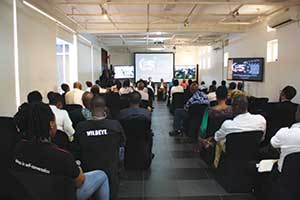The last day of the fifth edition of the four-day iREPRESENT International Documentary Film Festival (iREP 2015) on March 22 featured an Art Stampede organised by the Committee for Relevant Art (CORA) in conjunction with iREP.
With the theme, ‘Digital Broadcasting and Artistic Freedom’, it featured a keynote address, fittingly via Skype, by Prof. Awam Amkpa of the New York University, United States/Abu Dhabi. Panellists for the stampede which was moderated by a lawyer, Deji Toye, included people in arts and culture like Prof. Niyi Coker, Victor Okhai, Ropo Ewenla, Ojoma Ochai, Toni Kan, and of course Amkpa.
Amkpa’s brilliant presentation, among other things, asserted that we need to diversify where we go to for traditions of storytelling and bring all of them to the digital platform, since it is here to stay. He also explained that what will distinguish filmmakers in digital filmmaking is how they use the medium.
Cameroonian filmmaker, Jean-Marie Teno, responding to the presentation, said filmmakers have always been making films but no one is talking about storytelling. He also underscored the importance of editing in filmmaking.
There’s still so much to do to teach young people how to use the digital medium to tell a story in the long term, he added.
For Okhai, it isn’t so much a matter of content as it is of distribution because the talk is about platform, how it has democratised the distribution process.
“What we are looking at here is how digitalisation is giving us the freedom to be able to express ourselves,” Okhai said.
Content at this stage is very vital and the digital platform just becomes the highway in which we put it, said Prof. Coker. “This is because we have a responsibility right now to our brethrens in the Diaspora, to Africans (because) the content we show could be reflective of who we are as African people, to make them educate generations beyond themselves separated from the continent of Africa for so long to understand that we have to use the digital platform in unification of Africans around the world.”
Toni Kan said it was a shame that those who should be in the audience to hear the conversation were not there, that is, filmmakers.
“Same for those who are in the digital space, bloggers; they are not here to hear what we are saying. This has gone well, but those who need to hear it are not here,” he said.
Ochai said that in filmmaking, whether it is Photoshop or Final Cut, there is an audience for all kinds of content. “I think that what (the) digital (platform) does is that the audience now has a stronger say, because now they have got options, they choose what they watch,” she said.
Day 3 on March 21 featured the panel with the theme, ‘Women in Film: Pushing the Boundaries in the Digital Space’. Moderated by Toyin Poju-Oyemade, the panellists included Mildred Okwo, Grace Edwin-Okon, Yvonne Bassey and Funmi Eko-Ezeh, all of them filmmakers, as well as the moderator.
They talked about their challenges and joys as women in filmmaking, with Okwo, who returned from the United States of America declaring, “I have more freedom as a woman filmmaker in Nigeria.”
For Edwin-Okon, the women filmmakers are doing their very best. And this becomes even more evident when Bassey tells the interesting story of shooting her ‘Thru African Eyes’ documentary on the Egyptian pyramids that screened a day before.
Day 3 like Day 4 also featured the screening of a lot of documentaries including, ‘The Supreme Price’ (Joanna Lipper), ‘Unbroken; The John Sumonu Story’ (Toyin Poju-Oyemade), ‘The Imam and the Pastor’ (Alan Channer), ‘Rough Aunties’ (Kim Longinotto), and a host of many others.
Perhaps, one of the high points of Day 2 was the panel with the theme ‘Digital Documentary and Citizen Journalism: The Security Imperative’. Moderated by Prof. Femi Shaka, the panellists included Tam Fiofori and Dr. Alan Channer. It was curated by the Department of Film Studies of the University of Port Harcourt. It was during the discussion in this panel that Channer made the famous statement, “What we are creating through social media are unsocial citizens.”
The awards iREP gives out every year also featured this year amid a colourful ceremony, with Aduke and her band making melodious music while guests enjoying cocktails and canapis courtesy of Africa Magic, who sponsored the awards segment of the festival.
Regional Director, MNet (West Africa), Wangi Mba-Uzoukwu, expressed her excitement at sponsoring the festival. She said Africa Magic remained committed to telling stories of Africans by Africans.
Poju-Oyemade, who compered the event, explained that the fifth anniversary of the festival was special. She added that the film festival was a labour of love for many. “Nobody gets paid,” she said. So it was important that the people who had supported the event from its inception be recognised and applauded for what they have done.
The first recipient of the 2015 iREP award was Charles Okolo of The Guardian newspaper for his tireless efforts every year in making sure the photo stories from the festival were enjoyed by readers of the paper. Lolu Durojaiye of AVF also received an award for his contributions in terms of audiovisual equipment to the event. Professors Coker and Amkpa also received awards for the wealth of experience they have brought to the festival each year.
Other awardees of the night included festival faithful, German producer Barbel Mauch, and Iyabo Abaoba, manager of Freedom Park, which is home to the festival. An excited Mauch, who was short of words at being honoured, eventually found her voice and acknowledged that the award was her first.
The iREP team was not left out of the action, as Eustace Estaghara, Emmanuel Orosun, Lanre Olupona, Toyin Poju-Oyemade, Theo Lawson, Makin Soyinka, Jahman Anikulapo, and Femi Odugbemi all bagged awards. Lawson was also celebrated by the crowd who sang him a birthday song.
The festival started on Thursday, March 19, with the screening of Unforgiven, a Rwanda-Germany documentary by Lucas Augustin. The opening screening of Chameleon, a Ryan Mullins’ 2014 documentary film, was deferred owing to technical hitches.
The opening ceremony commenced with a welcome address by Executive Director of iREP, Femi Odugbemi, who thanked the festival’s staff, volunteers, partners, sponsors and individuals that had supported the festival from inception five years ago. His welcome address was followed by the keynote speech.
In his speech titled, ‘New Values for Audience Development in a Digital Space’, the Managing Director of Multichoice Nigeria Limited, John Ugbe, observed that the response to the right content is no longer subject to a six-month research or survey, but is now immediate because two screens are available to the audience in the digital age – one for watching content and the other for giving feedback to the content provider on social media: Twitter, Facebook, etc. This second screen, he remarked, is usually a phone.
Ugbe explained that quality content was paramount in the digital space, stating that it did not matter where content was produced: a bad story remains a bad story. He added that even with top-notch technical quality, if a story was not compelling, it would not make the desired impact.
In his own remarks, Marc-André Schmachtel, the Director of the Goethe-Institut Lagos, expressed happiness that iREP offered the opportunity for German documentaries to be screened, and was delighted by the privilege offered by non-fictional films, which he believes promotes a people’s history and culture.
Film Programme Manager, British Council, London, Wendy Mitchell, delivered a short speech from Director, British Council, Lagos, Ojoma Ochai, who was unavoidably absent.
Ochai stressed that “we need to tell our own stories better”. Mitchell also informed the audience of about 15 new programmes and grants initiated by the British Council.
This edition explored the theme, ‘Reinventing Documentary Filmmaking in a Digital Space’. It held four different training programmes and workshops, taking young filmmakers through the rudiments of production and acquisition of technical expertise. There were also workshop sessions for already practising filmmakers to hone their skills, and especially on distribution opportunities in the context of digital broadcasting era. The trainings and workshops were conducted by experts drawn from the UK, Germany and the U.S.













